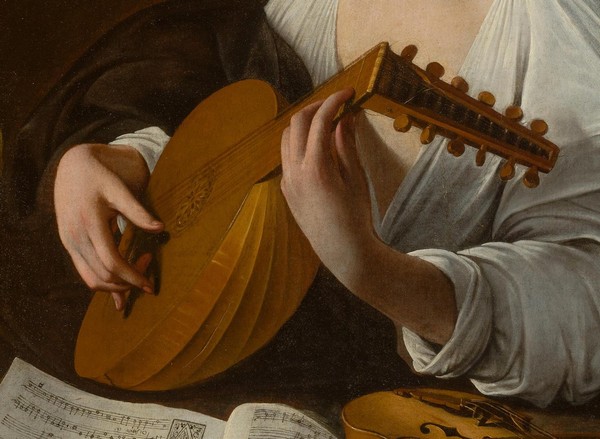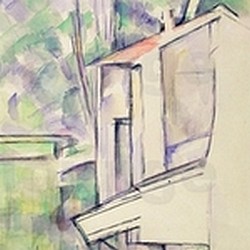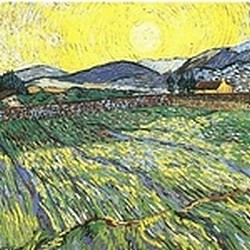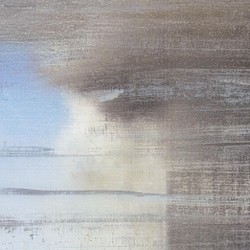
If Die schöne Müllerin were a film, all the scenes (each scene, one song) would be exterior shot. All but one: Pause. We see the wanderer between fields, in the forest, by the stream, at the foot of the window of the maid of the mill... But at Pause, the twelfth song, he's in his room. The last verses of the previous one, Mein!, hints at why he takes refuge: Ach, so muß ich ganz allein / Mit dem seligen Worte mein / Unverstanden in der weiten Schöpfung sein! [Ah, so I must be all alone / With my blissful word, / Incomprehensible to all of Creation!]. So far, he has relied on nature, but the emotions that fill him are so intense and surely so bewildering that he needs to be alone. And he pauses, trapped within the walls for the first and last time.
In this Lied we found something else: the miller, who would have left home with a few belongings in a bundle, took a lute with him, and with this lute he has sung and relieved his sorrow. Now that he is happy, however, he can no longer sing, because no sound can hold his joy. Despite these feelings, the poem is ambiguous. The miller needs the silence; the slightest sound of the strings, even if a light air makes them vibrate, makes him anxious and shiver. And why does he get anxious by this light sound? Because it reminds him of the love sorrows he had sung, and he fears it would be a premonition. We know that his fears will come true, he will only have one more moment of happiness, when he gives the maid of the mill the green ribbon of the lute; then uncertainties, suspicions and disappointment arrive.
In many of the cycle's poems, Wilhelm Müller uses a regular strophic structure, often with four or six-line stanzas. In the previous poem, the exaltation of the young man is expressed with a single stanza in which all fifteen verses rhyme with Mein; The structure of Pause is also singular, it has two stanzas of different extent (ten and eight verses) with rhyming pairs. After the euphoria, Schubert gives evidence of subtlety and composes with these verses one of the most beautiful Lieder in this cycle. The young miller tells us he can't sing, so the composer has to convey his silence. And he constructs a vocal line that tends to declamation, at least at the first four verses; the vocal line becomes more melodic in the following four verses, when the young man remembers the songs that sadness inspired him, and returns to the declamation in the last two verses of the stanza, with a repetition that shows a usual feature of Schubert's many Lieder: according to what you hear, do you think the boy is happy?
Although this Lied is not strophic, it retains its appearance due to two elements. The first one is the repetition of the melody in the first two verses of the second stanza; not identical, but similar enough to misled us. The other element is heard in the relatively long prelude of the song, the first three bars, which are repeated often during the song. In this case, the repetition, in addition to increasing the strophic song feeling, also suggests to us the miller's obsession, which we have already perceived in other songs. After the repetition of the melody of the first stanza, the following two verses reflect the miller's anxiety when he hears the slight sound of the lute; the next to even increase this feeling, because he could avoid it: he cannot control the air that moves the strings, but he left the green ribbon too long. The final two verses in the poem are two questions. However, the last one doesn't sound as a question, but as an affirmation. And since Schubert repeats both verses, we can check this: the young man claims that these spurious songs are the prelude to new songs. And he sings when he suffers.
I usually say that listening to an only song from a cycle is a kind of betrayal, because it has no context, and that's why I often invite you to listen to the whole cycle. This article is published on Wednesday 17, and some lucky people are listening, the next day, to Die schöne Müllerin in Barcelona with Andrè Schuen and Daniel Heide. Those of you can't be at this concert or another one on the tour, listen at least to their recording. And here you have a sample.
Meine Laute hab’ ich gehängt an die Wand,
Hab’ sie umschlungen mit einem grünen Band –
Ich kann nicht mehr singen, mein Herz ist zu voll,
Weiss nicht, wie ich’s in Reime zwingen soll.
Meiner Sehnsucht allerheissesten Schmerz
Durft’ ich aushauchen in Liederscherz,
Und wie ich klagte so süss und fein,
Glaubt’ ich doch, mein Leiden wär’ nicht klein.
Ei, wie gross ist wohl meines Glückes Last,
Dass kein Klang auf Erden es in sich fasst?
Nun, liebe Laute, ruh’ an dem Nagel hier!
Und weht ein Lüftchen über die Saiten dir,
Und streift eine Biene mit ihren Flügeln dich,
Da wird mir so bange und es durchschauert mich.
Warum liess ich das Band auch hängen so lang’?
Oft fliegt’s um die Saiten mit seufzendem Klang.
Ist es der Nachklang meiner Liebespein?
Soll es das Vorspiel neuer Lieder sein?
My lute I've hung upon the wall,
I've tied it there with a green band;
I can sing no more, my heart is too full.
I know not how to compel the rhymes.
The hot pain of my yearning
I once could exhale in jesting songs;
And when I complained, so sweet and fine,
It seemed to me my sorrows weren't small.
Ah, but how great is my joy's weight,
That no sound on earth can hold it?
Now, dear lute, rest on this nail here!
And if a breeze flutters over your strings,
And if a bee grazes you with its wings,
It makes me anxious and I shudder through and through.
Oh, why have I left that ribbon hanging there so long?
Often it stirs the strings with a sighing sound.
Is it the echo of my lovelorn pining?
Shall it be the prologue to new songs?
(translation by Emily Ezust)


 1823...
1823... By 1817...
By 1817...










